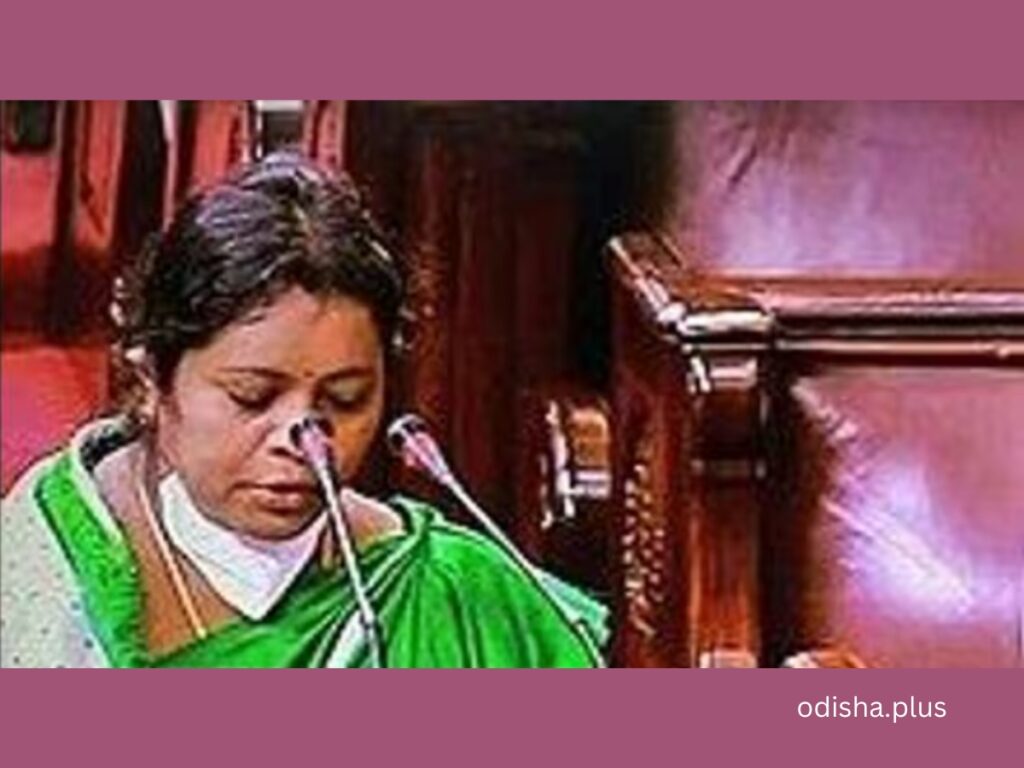“However, I feel that there is no requirement of the services of myself as well as my community in the Biju Janata Dal. Therefore, I have taken this hard decision in public interest,” says Mamata Mahanta
Bhaskar Parichha

In a notable blow to the Biju Janata Dal, MP Mamata Mahanta announced her resignation from the Rajya Sabha on Wednesday, two years prior to the end of her term. The representative from Mayurbhanj, Odisha, also left the regional party, stating that she made this “difficult decision in the interest of the public.”
In her resignation letter from the party, Mahanta conveyed her appreciation to BJD chief Naveen Patnaik for providing her with the chance to serve the people of Mayurbhanj and to represent the state on a national scale. “However, I feel that there is no requirement of the services of myself as well as my community in the Biju Janata Dal. Therefore, I have taken this hard decision in public interest,” she wrote.
Significant Shift
This unexpected move, described by her party associates as “sudden,” occurs as the BJD intensifies its criticism of the Narendra Modi-led central government. Following the party’s losses in both the Lok Sabha and assembly elections, the BJD declared its intention to cease providing “issue-based support” to the NDA government and to position itself as a “strong and vibrant” opposition in Parliament. This marks a significant shift from its previous stance prior to the electoral defeats.
With her resignation, BJD’s number in the Rajya Sabha comes down to eight. The BJP has one member in Rajya Sabha from Odisha – Ashwini Vaishnaw, who was elected earlier this year.
The BJD had chosen Mahanta from the Kudumi caste (an OBC group), as part of the effort to rebuild the party’s base in tribal-dominated Mayurbhanj district. In Odisha, the 25-lakh strong Kudumi community is mostly seen in Mayurbhanj, Keonjhar, Sundergarh and Sambalpur districts where they can impact the poll results. In Mayurbhanj and Keonjhar, the Kudumis have traditionally been BJP supporters.
Mahanta’s journey to the Rajya Sabha is a testament to her dedication to serving her community and her ability to navigate the complex political landscape of Mayurbhanj. As a member of the Kudumi caste, she has faced discrimination and marginalization throughout her life, but she has never let that hold her back. Her background in education has equipped her with the skills and knowledge needed to advocate for the rights of her community and work towards their empowerment. During her time as a zilla parishad member and president of the BJD’s women’s wing, Mahanta worked tirelessly to uplift women and marginalized groups in Mayurbhanj. Her involvement in the Mission Shakti initiative further solidified her commitment to promoting self-reliance and economic independence among women in the region.
Her nomination to the Rajya Sabha in 2020 was recognition of her hard work and dedication to the party and the people of Mayurbhanj. Despite facing setbacks, in 2019, elections, Mahanta’s election to the Rajya Sabha has given the BJD a renewed sense of hope and momentum in the region. Her grassroots leadership and commitment to social justice made her a valuable asset to the party and a powerful voice for the marginalized communities of Mayurbhanj. As she continued to advocate for the rights and welfare of her constituents, Mahanta’s presence in the Rajya Sabha made a positive impact on the political landscape of Mayurbhanj and beyond.
Bigger Role
In the hours leading up to her departure from both the Rajya Sabha and the Biju Janata Dal (BJD), she actively participated in the morning session of the parliamentary proceedings, indicating her continued engagement in legislative activities until the very end of her tenure. This sudden exit has sparked a flurry of speculation regarding her future political alignments, with many observers suggest that she may be considering an alliance with the Bharatiya Janata Party (BJP). Such a move could significantly reshape the political landscape, especially given her influence and experience.
Furthermore, there are indications that she could be positioned for a more prominent role in the upcoming Jharkhand assembly elections. Her potential involvement could bring valuable insights and strategies to the BJP’s campaign efforts, particularly in a state where political dynamics are constantly evolving.
As for the Rajya Sabha seat that has been vacated due to her resignation, the Election Commission of India (ECI) is anticipated to announce the election schedule in the near future. This development is crucial, as it will determine the next steps for the BJP and other political parties vying for the seat. With the BJP currently enjoying the backing of 78 MLAs along with the support of 3 independent MLAs, the party is well-positioned to navigate the Rajya Sabha polls with relative ease. This strong support base suggests that the BJP could secure the vacant seat without significant opposition, further consolidating its presence in the upper house of Parliament.
All attention is now focused on the potential BJP candidate for the seat left vacant by Mamata.
(The author is a senior journalist and columnist. Views expressed are personal.)

















